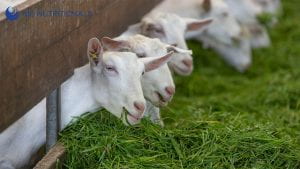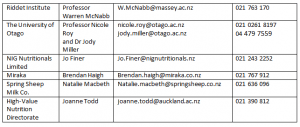
A grant of $1,410,978 has been awarded by the High-Value Nutrition (HVN) Ko Ngā Kai Whai Painga National Science Challenge to the Riddet Institute at Massey University.
Warren McNabb, Professor of Nutritional Sciences at the Riddet Institute, in conjunction with the Department of Human Nutrition at the University of Otago (Professor Nicole Roy and Dr Jody Miller) and industry partner NIG Nutritionals Limited (NIGN), will conduct a three-year study that aims to identify the impact on digestive comfort, nutritional status and skeletal muscle function from adding whole milk powders to the diets of older adults.
The study will look at three different types of milk powder: goat milk, provided by NIGN; cow milk, provided by Miraka; and sheep milk, provided by Spring Sheep Milk Co.
This study builds on research that indicates milk from different species have differing composition and structures that could lead to differences in digestive comfort and metabolism. NIGN is the lead industry partner and is co-funding the study.
The project aligns with the HVN aim of developing high-value foods with validated health benefits to drive economic growth. Consuming milk confers nutritional and digestive health benefits in infants and children. However, the longer-term impact on nutritional benefits and digestive comfort in older adults has yet to be clarified.
“The study aims to compare digestive and metabolic responses and impact on the protein status of older adults to the daily addition of goat, cow or sheep whole milk powder to their regular diet for 12-weeks in a home setting.”
– Professor Warren McNabb.
Comparisons will be made between milk groups and a control group who will consume their regular diet, with no additional milk.
“One of the main objectives of the study is to determine the longer-term impacts of milk consumption on the nutritional status and metabolism of healthy older adults, including body composition and muscle strength.”
– Joanne Todd, Director of the HVN National Science Challenge.
Other objectives include measuring the acute and longer term effects of milk consumption on ease, frequency, and severity of gut discomfort symptoms of healthy older adults, and the longer-term impacts of milk consumption on biological markers of health of older adults utilising distinct Riddet Institute and Otago University capabilities.
Collaborations will be part of this project including the New Zealand Milks Mean More (NZ3M) Endeavour programme hosted by the Riddet Institute at Massey University and the HVN Digestive Health Priority Research Programme led by the University of Otago.
The outcomes may support the formulation of unique milk products that will improve digestive comfort, diet quality, and measures of quality of life, sleep quality and mood, while also potentially bringing increased economic benefits to Aotearoa New Zealand’s goat, cow and sheep producers.
The HVN Challenge is a mission-led programme of innovative research into the health attributes of New Zealand-produced foods for our major export markets.
The Challenge has through its contestable funding process recently approved a large number of innovative projects that will be completed together with industry and business partners.
For more information:

High-Value Nutrition Ko Ngā Kai Whai Painga is one of the eleven National Science Challenges. The Challenge has $45 million of funding for 2019 – 2024.
For media inquiries please contact Joanne Todd, Director, High-Value Nutrition National Science Challenge.
Email: joanne.todd@auckland.ac.nz
Mobile: 021 390 812